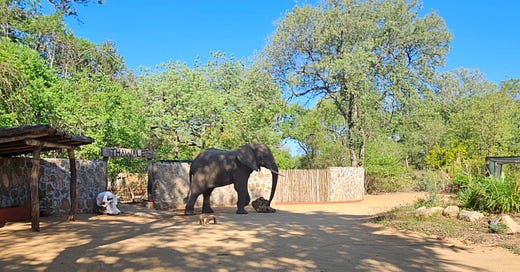JUMBO DIARY - An emotive elephant experience inside Majete Wildlife Reserve
Current founder population of elephants in Majete Wildlife Reserve was translocated from Phirilongwe Forest Reserve in Mangochi after strained human wildlife conflict threatened their very survival
CHIKWAWA, Malawi (Planet Defence) - In 2009, the International Fund for Animal Welfare (IFAW) partnered with government of Malawi to relocate a group of approximately 60 elephants. These elephants were residing in Phirilongwe Forest Reserve, sharing their habitat with about 3,000 subsistence farmers, writes John Andedorff, while sharing an emotive experience he had with one of the jumbos fifteen years after their relocation from Phirilongwe in Mangochi to Majete Wildlife Reserve.
The relationship between the villagers and the elephants was strained, to say the least. The elephants had been responsible for the deaths of 10 people in the past, prompting the villagers to resort to using arrows, snares, poison, and other cruel techniques to protect themselves and their crops.
The elephants had posed a danger to the local farmers and their livelihoods, and the farmers, in turn, hadn’t been kind to the elephants. It became evident to the government that for both species to co-exist peacefully, the wildlife and human populations needed to be separated.
This led to the decision to move the elephants to the extreme south at Majete Wildlife Reserve, a secluded area over 150 miles south of Phirilongwe.
It was at this critical juncture that IFAW stepped in to assist. “In order to save these elephants, we must act now – otherwise, they will be killed as ‘problem animals’,” said Jason Bell-Leask, IFAW Director for Southern Africa.
“This monumental translocation of over 60 elephants addresses a significant conservation challenge and ultimately ensures the safety of both animals and people. It sets an example for adopting an ethical approach to elephant management practices,” stressed Bell-Leask.
To accomplish this challenging relocation, on June 7th, 2009, IFAW tranquilized the elephants with humane darts and then transported them using modified game trucks to their new home in Majete Wildlife Reserve.
Nearly 15 years later, following the translocation from Phirilongwe near Lake Malawi, the elephants have now settled fully, providing a truly humbling experience for me.
Over my 28 years as the head of conservation in Addo Elephant National Park, I have often witnessed elephants revisiting the remains of their fallen herd members. In the Nyathi section, a specific herd returned year after year to pay respects to a matriarch who had passed away years earlier.
At Thawale, a newly built tourist lodge at Majete, where I recently placed the skull of an elderly elephant bull in his late fifties, a similarly aged bull approached.
The elephant sniffed and interacted with the skull, leaving no doubt in my mind that he recognized the fallen jumbo. The intricate way he sensed and smelled the skull suggested a clear recollection.
The elephants of Majete have encountered significant challenges, having been relocated from a small reserve under severe human pressure near the lakeshore to Majete, as the founding large mammal species population.
This relocation occurred after the Majete elephants were driven to complete extinction in the 90s. The trauma they must have experienced is beyond imagination.
Remarkably, one can observe behavioral changes year after year, and they are now settled in Majete, gradually learning to trust humans again.
Standing beside this bull as he explored the skull was a truly awe-inspiring experience, offering a glimpse into the thoughts and emotions of these majestic creatures, concluded Andedorff.
*Additional writing by Charles Mkoka



